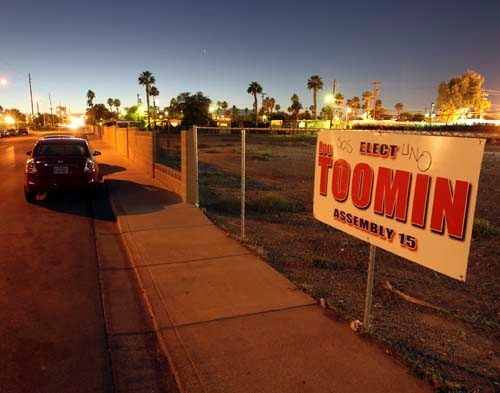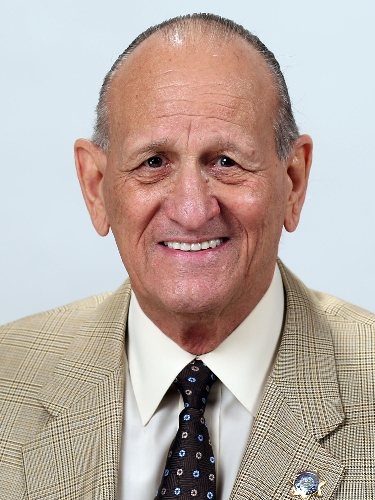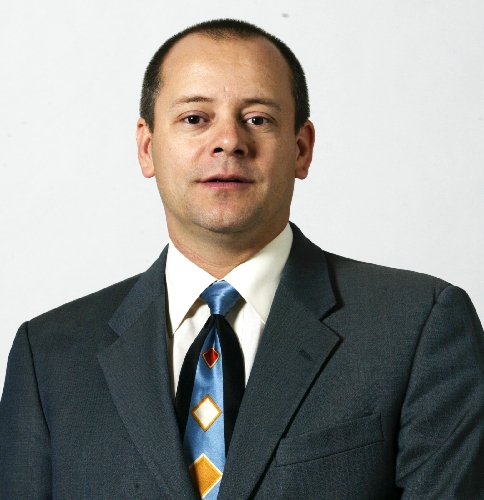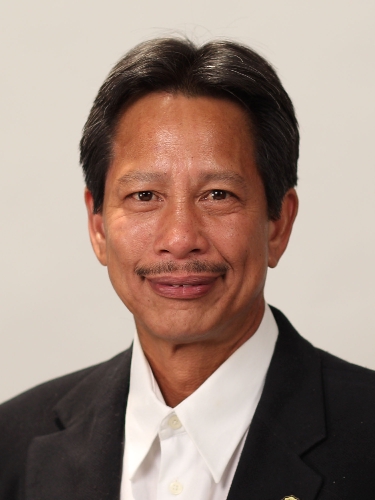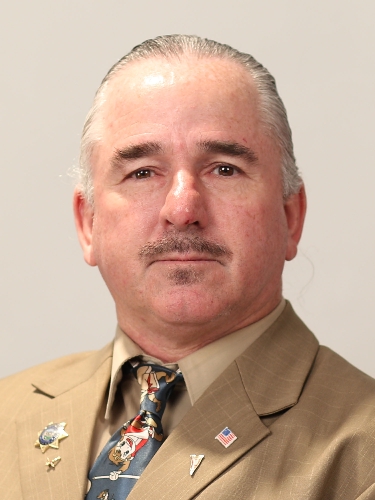Candidates have strong ties to Las Vegas Township constable
A new political party formed in Las Vegas this year, one where ideology and past party affiliation don't seem to matter.
Some of the party's candidates in both the primary election and on the Nov. 6 ballot are Democrats and some are Republicans. Some have held elected office in the past while others exhibit little or no interest in government and politics.
It appears the only thing this party's slate of candidates have in common are strong ties to one of the most controversial elected officials in Clark County, Las Vegas Township Constable John Bonaventura.
The constable, whose actions since taking office in 2011 have prompted calls for legislation to rein in all constables, helped create a political action committee, NV PAC, in 2008. It's not a big money operation, but it helped finance Bonaventura's campaign and efforts of his family, friends and employees to win seats in the Nevada Legislature. It's unusual, as no other county constables have PACs. Moreover, he reportedly has offered bonuses to employees to challenge his critics in the Legislature.
This new political party doesn't have an official name. Just call it Bonaventura's machine.
Exactly what that machine aims to accomplish beyond putting friends and associates in positions of power is unclear.
Local constables serve court papers and carry out evictions. They're classified as Nevada peace officers, wear uniforms with badges and carry guns and Tasers for protection.
While they can make arrests and even do traffic stops, they are not the same as police officers. In fact, they are not even public employees. The elected constable has the power to deputize anyone but a felon, and his office is financed by fees charged for each paper served and eviction supervised.
The work sounds mundane, but the constable's ability to pin a badge on nearly anyone carries great power, both on the job and in politics.
NV PAC HELPED OUST INCUMBENT
Bonaventura's machine includes six current or former employees of his office:
■ Lou Toomin, the constable's public information officer, who ran for state Assembly 15 in June's Democratic primary;
■ Deputy Steven Maczka, who ran for Assembly 34 as a Democrat;
■ Deputy Arthur Martinez, who is running for Assembly 8 as a Republican;
■ Deputy Luis Rendon, who ran for Assembly 28 as a Democrat;
■ Nathan Schlumpf, a constable process server, who ran for Assembly 36 as a Republican;
■ Anthony Wernicke, a perennial candidate for various offices whom Bonaventura deputized briefly last year, is running for Assembly 36 as a Democrat.
In addition, several of Bonaventura's family, close friends and business associates have mounted current or recent campaigns:
■ His wife, Gloria Bonaventura, a member of the State Board of Education, ran for Assembly 20 as a Democrat;
■ Jesse Cantero, whose attendance at Bonaventura's law enforcement academy was financed by the constable's office, ran for Assembly 16 as a Democrat;
■ Conrad Vergara, a business associate, ran for Senate 18 as a Republican;
■ Don Watkins, a relative of the constable's chief operating officer, Jason Watkins, ran for Assembly 9 as a Democrat.
Only Martinez, a Republican, and Wernicke, a Democrat, made the Nov. 6 general election ballot. They had no primary opponents. Few of the candidates invested either time or money on their campaigns. Their opponents say they seldom saw the machine candidates at campaign events, nor did they show up for debates.
The Assembly 36 race, for example, involved several campaign events but Schlumpf was never at any of them, according to one of his opponents, Delmar Leatham.
And in the race for Senate 18, Republican opponent Richard McArthur said he never saw Vergara at any events.
"If he was at one, he didn't come up and say 'hello,' " McArthur said.
When a few of the candidates ran for office two years ago, they had the help of NV PAC, of which Bonaventura was an officer. The fund distributed $5,000 among four candidates: Bonaventura, his wife, Cantero and Schlumpf.
Most of the PAC's money came from a company called Energy Ventures Organization Inc., of which Bonaventura was an officer. Schlumpf is now president of the company, whose purpose and business are murky.
This year, all of the candidates linked to Bonaventura were long shots; but in 2010 NV PAC's $500 helped catapult Bonaventura, a long shot himself, to victory.
Bonaventura, who had run several times for various offices since serving a single undistinguished Assembly term in the early 1990s, was up against a longtime, popular incumbent. He spent just $1,410 with two weeks to go before the Democratic primary that year. The incumbent Democrat, Robert "Bobby G." Gronauer, spent more than $42,000.
But Bonaventura ousted Gronauer, and easily won the general election. Since then, he has been subject to scrutiny over creation of a reality television program that showed one of his deputies making traffic stops, allegations of sexual harassment, jurisdictional disputes and the hiring of deputies with questionable histories.
EX-EMPLOYEE FIGHTS FIRING
So what is behind the unusual number of constable employees running for office?
One former deputy said Bonaventura recruits candidates at work.
"He asked me what area I lived in because he wanted me to run because he was trying to get as many people as possible, but I lived in the same district his wife was already running in," former Deputy Kristy Henderson said recently.
Bonaventura did not respond to calls for comment, and only three of the 10 candidates could be reached for comment. Calls to most went unanswered.
Rendon denied that anyone asked him to run and added that, as a deputy, he has little contact with Bonaventura.
"I wanted to run for years, to be frank," he said. "I would seriously doubt that he would suggest (running)."
Toomin also said that he wasn't aware of Bonaventura asking anyone to run.
"As far as I know, it's not true," Toomin said. "He wouldn't ask anybody to run for office."
Wernicke, who quit the constable's job last year because of back problems, said he was a close friend of Bonaventura's but wasn't encouraged to run for an Assembly seat.
Henderson, who was fired in July but is fighting the decision, also said Bonaventura offered $50 to anyone who could find someone to run against Assemblywoman Marilyn Kirkpatrick.
"We were all like, 'What's his problem with Marilyn Kirkpatrick?' " Henderson said.
Kirkpatrick sponsored one bill in the Legislature last year that would have benefited the constable's office, but was blamed for dooming another one.
She sponsored legislation that would have allowed constables to negotiate higher fees for serving court papers. The bill went nowhere.
Jason Watkins, the constable's chief operating officer, helped Las Vegas Democrat Paul Aizley and others write the other bill. It would have offered tax incentives to lure movie studios to Nevada and was to be amended to add a requirement that studios hire constable deputies for movie set security. But Kirkpatrick introduced a competing bill that provided fewer tax incentives, and Watkins blamed her for confusing the issue.
Neither bill was passed, and Watkins vowed to oust her from office.
"I'll do everything in my power to make that happen," he told the Las Vegas Sun in June of last year.
Kirkpatrick, who ran unopposed for re-election, has said she plans to introduce legislation that would rein in the state's 14 constables when the Legislature meets in February.
CAMPAIGNING IN UNIFORM
According to the Nevada secretary of state's office, it's not illegal for political candidates to campaign while in uniform, but police agencies commonly discourage officers who run for office from doing so.
That doesn't appear to be an issue for constable deputies.
Martinez appeared in uniform at a debate earlier this year sponsored by Veterans in Politics, a political group. A video of it is on YouTube.
And incumbent District 28 Assemblywoman Lucy Flores said her staff and campaign volunteers spotted Rendon cruising primary polling sites.
"He was driving around in his constable car and his uniform," Flores said.
Rendon said last week that he might have been seen in the area, but he couldn't remember, and he wouldn't have been campaigning.
"I worked the area, so I don't know that I was there outside of official capacity," he said. "I couldn't remember. That was kind of a while back ago for me."
Rendon said he wasn't aware of any restrictions on campaigning in uniform, comparing it to a McDonald's employee showing up to a debate in the fast-food chain's uniform.
Toomin also appeared in a constable's uniform, complete with handgun, at the Winchester Cultural Center in December. While Toomin hadn't yet filed to run for office, he has run in every election since 1990. His primary opponent, incumbent Elliot Anderson, said there was "not a doubt in my mind" that Toomin was there to lay groundwork for a campaign against him.
Appearing in a police uniform can bestow a powerful political advantage, Anderson said.
"I would suspect that would be an advantage as far as presenting yourself as someone protecting the community," Anderson said. "I think he probably tried to portray himself that way."
Toomin said he went to the meeting as a "concerned citizen" about a proposal to build a crematorium in the district, and he was in uniform because he had come from work.
"I was not campaigning last December," Toomin said. "I was not campaigning until I filed for office'' in March.
Toomin's appearances prompted a sharp rebuke from County Commissioner Chris Giunchigliani.
"It's very uncomfortable when your PIO (public information officer), who is my constituent, goes to neighborhood meetings carrying a gun and makes comments such as, 'Oh, hey, better watch out, I'm carrying a gun,' " Giunchigliani told several deputies at a January commission meeting. "That borders on the line of harassment, in my opinion, and could potentially threaten some of my constituents and that's not how business should be handled. ... There's an inference there and it taints everybody, and that's the unfortunate part of this."
NONEXISTENT COMPANIES
Legislative campaigns often involve budgets - whether minuscule or in the millions - depending on a candidate's fundraising efforts. Bonaventura's candidates raised and spent very little, but even those small sums present potential problems.
Maczka, the deputy who ran for the Democratic nomination in Assembly 34, filed campaign spending disclosure reports that show $800 paid to Reeber Signs for campaign advertising. But the company doesn't appear to exist; it's not registered with the city, county or state and can't be found in phone books or online. The address Maczka listed for the company - at 804 N. Rainbow Blvd., No. 141 - does not exist.
Maczka also claimed a $435 advertising expenditure to Camaretti Art, another company that isn't registered and doesn't appear anywhere. The address he gave for the company - 848 N. Rainbow Blvd., No. 141 - is real, however. It's a Mail Link Plus store. He also listed box 141 there for his campaign.
An employee there said she couldn't disclose any information about clients. Maczka did not return repeated phone calls seeking comment for this report.
The secretary of state doesn't have the resources to check each campaign expenditure, but it may be illegal for a candidate to claim payment to a company he knows to be nonexistent, Deputy Secretary of State Scott Gilles said.
Martinez and Wernicke, who will appear on ballots on Election Day next month, have raised and spent nothing.
Martinez faces an incumbent.
Wernicke said he believes his race will be close, but he's not terribly worried about the outcome.
"It's just something to do," he said. "If I win, I win. If I don't, I don't."
But that says nothing about future elections. Both Toomin and Rendon said they would run for office next year.
"I will be running until I die," Toomin has said.
Contact reporter Lawrence Mower at lmower@reviewjournal.com or 702-405-9781. Contact reporter Kristi Jourdan at kjourdan@reviewjournal.com or 702-383-0440.



